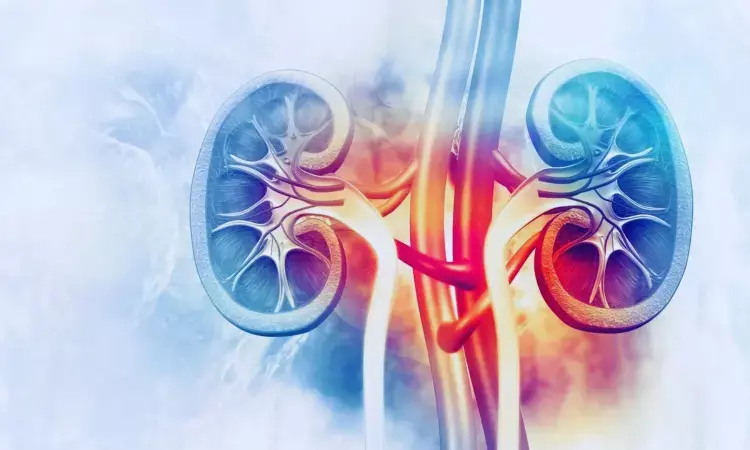- Home
- Medical news & Guidelines
- Anesthesiology
- Cardiology and CTVS
- Critical Care
- Dentistry
- Dermatology
- Diabetes and Endocrinology
- ENT
- Gastroenterology
- Medicine
- Nephrology
- Neurology
- Obstretics-Gynaecology
- Oncology
- Ophthalmology
- Orthopaedics
- Pediatrics-Neonatology
- Psychiatry
- Pulmonology
- Radiology
- Surgery
- Urology
- Laboratory Medicine
- Diet
- Nursing
- Paramedical
- Physiotherapy
- Health news
- Fact Check
- Bone Health Fact Check
- Brain Health Fact Check
- Cancer Related Fact Check
- Child Care Fact Check
- Dental and oral health fact check
- Diabetes and metabolic health fact check
- Diet and Nutrition Fact Check
- Eye and ENT Care Fact Check
- Fitness fact check
- Gut health fact check
- Heart health fact check
- Kidney health fact check
- Medical education fact check
- Men's health fact check
- Respiratory fact check
- Skin and hair care fact check
- Vaccine and Immunization fact check
- Women's health fact check
- AYUSH
- State News
- Andaman and Nicobar Islands
- Andhra Pradesh
- Arunachal Pradesh
- Assam
- Bihar
- Chandigarh
- Chattisgarh
- Dadra and Nagar Haveli
- Daman and Diu
- Delhi
- Goa
- Gujarat
- Haryana
- Himachal Pradesh
- Jammu & Kashmir
- Jharkhand
- Karnataka
- Kerala
- Ladakh
- Lakshadweep
- Madhya Pradesh
- Maharashtra
- Manipur
- Meghalaya
- Mizoram
- Nagaland
- Odisha
- Puducherry
- Punjab
- Rajasthan
- Sikkim
- Tamil Nadu
- Telangana
- Tripura
- Uttar Pradesh
- Uttrakhand
- West Bengal
- Medical Education
- Industry
Empagliflozin Reduces CI-AKI Risk in PCI Patients by Improving Renal Function: Study Reveals

Iran: A recent randomized trial has highlighted the potential of empagliflozin in reducing the risk of contrast-induced acute kidney injury (CI-AKI) among patients undergoing percutaneous coronary intervention (PCI). The study, published in Scientific Reports, suggests that this sodium-glucose cotransporter-2 (SGLT2) inhibitor may play a renoprotective role, particularly in middle-aged and elderly patients and those with varying degrees of renal function.
"Empagliflozin significantly reduced CI-AKI incidence in PCI patients by enhancing renal function markers, including eGFR and cystatin C. These protective effects were evident across different age groups, with notable benefits in middle-aged and elderly individuals, and those with varying degrees of renal function," the researchers wrote.
CI-AKI is a well-recognized complication following the administration of contrast media during PCI, often leading to adverse renal outcomes. Limited clinical trials have investigated the impact of SGLT2 inhibitors on CI-AKI. Addressing this gap, Zeinab Sadat Hossein, Student Research Committee, Mashhad University of Medical Sciences, Mashhad, Iran, and colleagues evaluated the short-term effects of empagliflozin, an SGLT2 inhibitor, in lowering CI-AKI incidence in PCI patients, irrespective of their diabetic status.
For this purpose, the researchers conducted a double-blind randomized clinical trial involving 121 patients undergoing PCI at Ghaem Hospital, Mashhad, Iran, between 2022 and 2023. Participants were randomly allocated to receive either empagliflozin (10 mg daily) or a placebo, starting one day before PCI and continuing for two days post-procedure. Renal function parameters, including estimated glomerular filtration rate (eGFR), creatinine, cystatin C, and urea, were assessed to evaluate the impact of empagliflozin on kidney function.
The following were the key findings of the study:
- Empagliflozin users showed a significant reduction in mean cystatin C levels compared to the placebo group across all age groups (<50 years, 50–60 years, and >60 years).
- Patients older than 60 experienced significant improvements in mean changes of eGFR with empagliflozin.
- Patients with eGFR >60 and 45
- There was a significant reduction in mean changes in cystatin C levels with empagliflozin across all eGFR levels (>60, 45–60, and <45).
- There were no significant differences in urea and creatinine levels between the empagliflozin and placebo groups.
The findings suggest that empagliflozin may offer a protective effect against CI-AKI, particularly in middle-aged and elderly patients and those with varying degrees of renal function. Notably, its administration in cardiovascular disease patients undergoing contrast procedures, regardless of diabetic status, appears to help preserve renal function post-contrast exposure. Additionally, cystatin C emerged as a crucial predictor of CI-AKI, demonstrating greater sensitivity in detecting renal function changes compared to urea and creatinine.
"Further research with larger cohorts and extended follow-up is essential to validate these results and gain deeper insights into the underlying mechanisms of empagliflozin’s renoprotective effects in contrast procedures," the researchers concluded.
Reference:
Hosseini, Zeinab Sadat, et al. "Short-term Effects of Empagliflozin On Preventing Contrast Induced Acute Kidney Injury in Patients Undergoing Percutaneous Coronary Intervention, a Randomised Trial." Scientific Reports, vol. 15, no. 1, 2025, p. 3940.
Dr Kamal Kant Kohli-MBBS, DTCD- a chest specialist with more than 30 years of practice and a flair for writing clinical articles, Dr Kamal Kant Kohli joined Medical Dialogues as a Chief Editor of Medical News. Besides writing articles, as an editor, he proofreads and verifies all the medical content published on Medical Dialogues including those coming from journals, studies,medical conferences,guidelines etc. Email: drkohli@medicaldialogues.in. Contact no. 011-43720751


